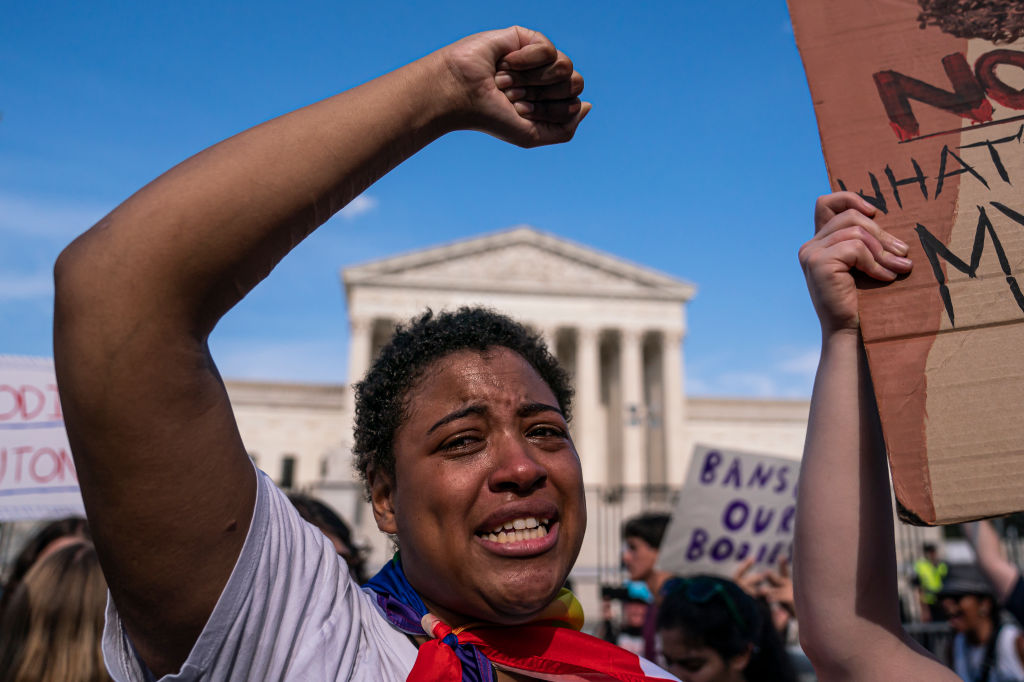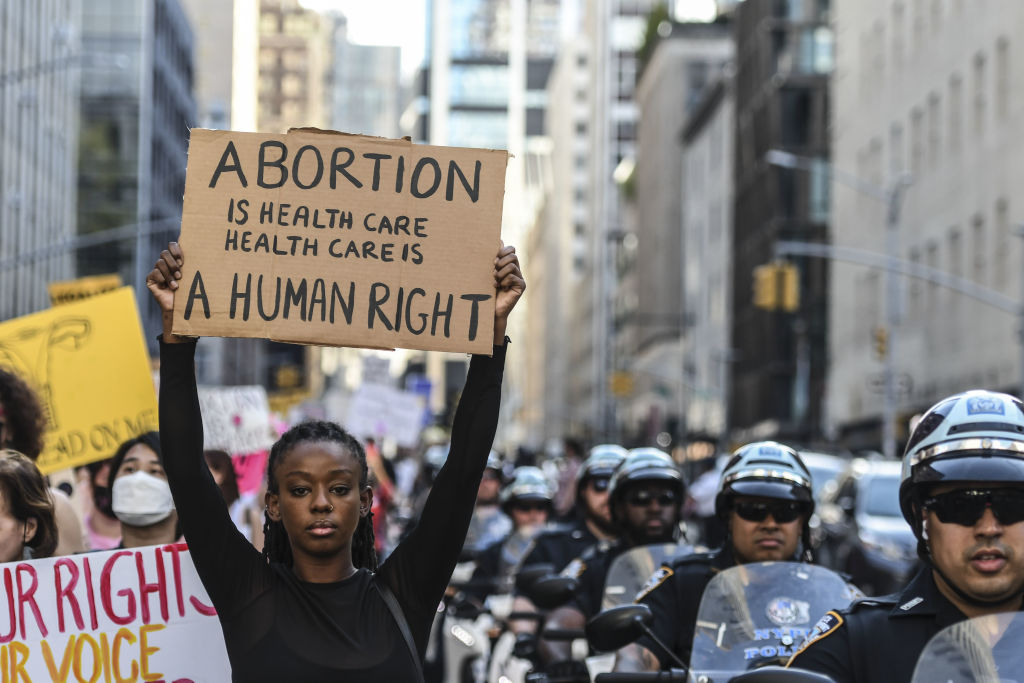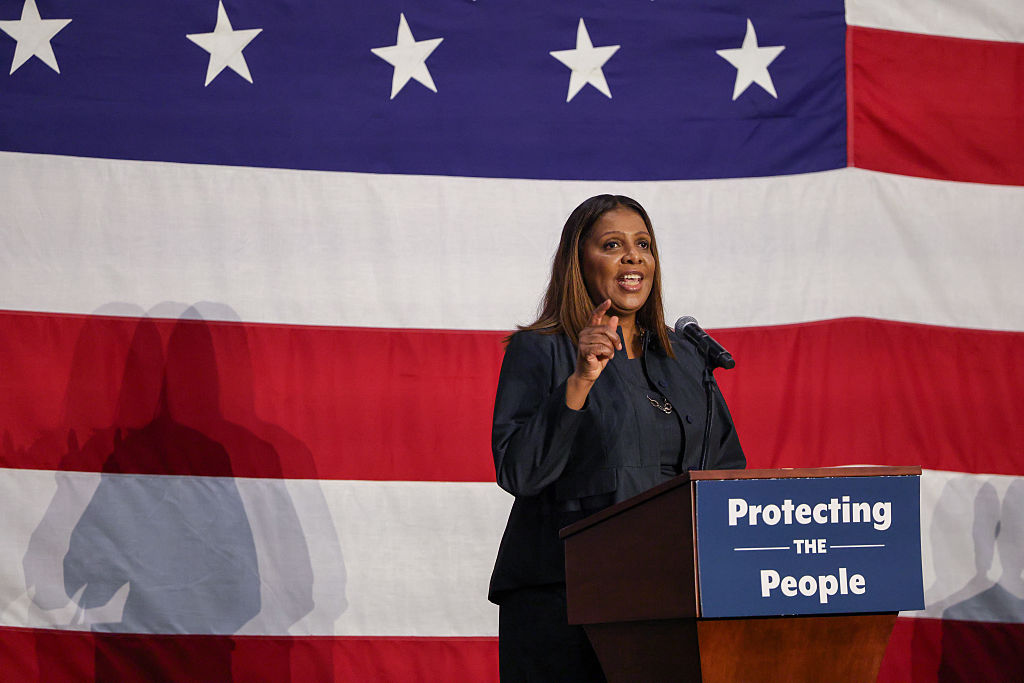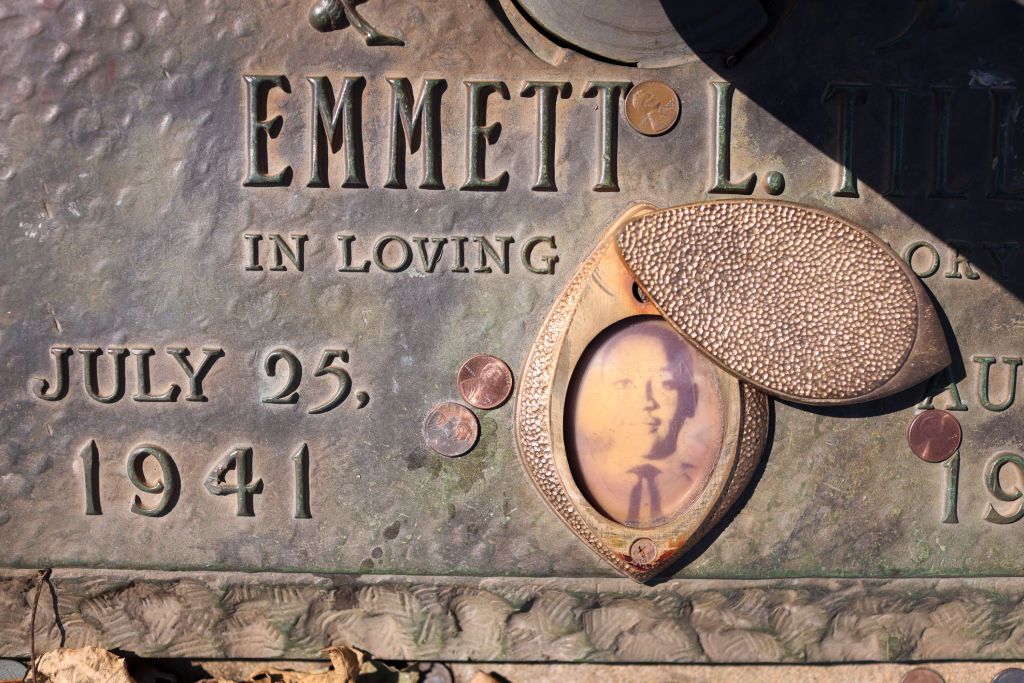Roe At 50: Reviewing Crucial Reproductive Justice Coverage
Reflecting On Roe At 50 – Reproductive Justice Stories To Revisit

Source: Nathan Howard / Getty
Sunday, Jan. 22, 2023, marks the 50th anniversary of the landmark decision Roe v. Wade, which established a right to abortion. That right was put in jeopardy after the Supreme Court’s decision in Dobbs v. Jackson Women’s Health Organization.
And while the impact of the Dobbs decision is still being felt across the country, reproductive justice advocates and allies continue to mobilize for the better. Many of the same people have been sounding the alarm long before Roe fell.
The landmark decision was always only a beginning, or as many have called it “a floor” for rights concerning reproduction and bodily autonomy. The right to bodily autonomy and privacy expanded far beyond establishing a theory of access. Anti-abortion groups have worked overtime to not only restrict access but remove any ability for millions of people to make decisions about when, how and if they become parents.
In a statement marking the would be Roe anniversary, NAACP Vice President of Policy and Legislative Affairs Portia Reddick White said “any attack on our fundamental human rights is an attack on our democracy.”
“The fall of Roe and subsequent bans enacted across our nation have proven what we already know to be true – without comprehensive protections for our rights, malicious legislators will stop at nothing to strip away the freedoms our ancestors shed blood, sweat, and tears for,” White said. “The NAACP will not stand idly by and allow our nation to move backward. We remain steadfast in our commitment to ensure that every American is able to exercise the freedoms guaranteed to them in our Constitution.”
As the nation reflects on the right to bodily autonomy 50 years post-Roe, we compiled a list of articles and op-eds on the fight for reproductive justice.
Black Women On Roe v. Wade: ‘Now’s The Time To Ensure Equity, Not Just Access’
Black reproductive leaders were clear about the tenuous nature of Roe and abortion access long before Dobbs was decided. Speaking with NewsOne on the 48th anniversary of Roe, a year and a half before Dobbs, several advocates spoke to the challenges facing Black and Brown communities and the limitations on the ability to make informed reproductive choices.
Abortion Is A Personal Medical Decision, Texas Case Shows Harm From Criminalizing Pregnancy Outcomes
Charges against Lizelle have been dropped, but the fact remains that the rush to criminalize Black and Brown women’s decision-making about their bodies has intensified in the past several years. And while some suggest Lizelle’s case wasn’t necessarily a result of the extreme anti-abortion law enacted last fall, the law’s passing created an atmosphere that seems to increasingly support criminalizing the end of pregnancy.
The Texas case is just the latest attempt by legal authorities to criminalize a pregnancy outcome. As Yellowhammer Fund Executive Director Laurie Bertram Roberts highlighted on Instagram there is a history of Black and other people of color being criminalized for pregnancy outcomes. Roberts noted that even searching for abortion pills has been used to try to criminalize people in the past.
OP-ED: Supreme Court Ruling Overturning Abortion Reaffirms The Role Of Reproductive Justice In Black Liberation
Written hours after the Supreme Court’s decision in Dobbs v. Jackson Women’s Health Organization, Paris Hatcher, executive director of Black Feminist Futures wrote that bodily autonomy is one of the most fundamental human rights.
Decided by the Court’s six conservative members, this decision will impact anyone who can become pregnant, their families and their communities. But, it will not affect us all in the same way. And for those who it impacts worst, it can be devastating.
The goal of the anti-choice and far-right movement made clear in the decision by Alito is twofold. First, they aim to make abortion as inaccessible as possible to as many people as possible. Second, they aim to make getting an abortion, helping someone get an abortion, or providing an abortion a crime.
History has shown us that when things become a crime, poor Black people are likely to be criminalized first and worst. That is because, throughout the history of the United States, hegemonic narratives have been used to classify Black people as inherently deviant and shiftless.
Black Reproductive Justice Leaders Discuss Navigating A Post Roe World
A month after the Dobbs decision, Deja Perez with MAJIC 102.3/92.7 FM hosted a conversation with reproductive justice advocates “In Our Own Voice- Post Roe: Now What for Black Women?”
Perez spoke with a panel of reproductive justice experts Marcela Howell, President & CEO In Our Own Voice: National Black Women’s Reproductive Justice Agenda, Abortion Care Network’s Deputy Director Erin Grant and Kwajelyn J. Jackson, executive director of Feminist Women’s Health Center. The panel put the need for electoral participation in the context of the current moment and shared insights into how people can get involved at the local and state level to protect abortion access and reproductive health.
Commentary: Anti-Abortion Proponents Have Their Roots In Pre-Emancipation Era White Supremacy And Efforts To Control Black Bodies
As Dr. Khiara Bridges in her opening statement during last week’s Senate hearing on Dobbs, Justice Alito’s rationale in Dobbs relied on ideology and principles that stood inapposite of the principles that brought about the need for the 14th Amendment in 1868, which informed the original Roe v. Wade decision.
Shireen Mitchell, founder and president of Stop Online Violence Against Women Inc., spoke with NewsOne about Alito’s use of precedent from before anyone other than White men had rights to justify overturning Roe.
“I think it’s really important because what happened is that Alito is saying he’s using precedent from 1825 to 1920 as the reason Roe should be overturned,” Mitchell explained. “And if you go back to 1825, you’re actually saying out loud that Black people still do not have bodily autonomy.”
Mitchell also said that Alito’s argument undermined the importance of the 13th and 14th Amendments. Harris noting this country’s history of forcibly controlling people’s bodies wasn’t a stretch. Alito picked that exact point in time as his point of inquiry for his anti-abortion crusade and rationalization for arguing that states could dictate whether individuals could choose for themselves whether to have an abortion.
‘Let’s Talk About Sex’ National Reproductive Justice Conference Meets In Texas
Two months after the devastating Dobbs decision, reproductive justice advocates and allies gathered in Texas for SisterSong’s “Let’s Talk About Sex” conference. Speaking with NewsOne, Monica Simpson, SisterSong’s executive director, called the convening a revolutionary act.
While some have tried to frame the abortion conversation as a white women’s issue, there is a deep history of Black women involved in reproductive spaces. Simpson stresses that Black women have long been a part of conversations around reproductive rights and bodily autonomy. Black women have been in this fight.
“We have been controlling our own fertility since we were stolen from our own land,” Simpson said. “We have been the midwives, we’ve been the doulas, we have been sex educators in our community when nobody was talking about it.”
People have begun to understand that abortion access is a healthcare battle. For SisterSong and other reproductive justice organizations, the connection must be understood.
“This reproductive justice framework has given us the ability to bring everybody into this conversation around abortion and sexual health,” Simpson explained. “All of this is connected. We can’t get or have Black liberation in this country if we are not centering our bodies and what our bodies need to thrive. And that’s exactly what the work of reproductive justice is about.”
Op-Ed: To Protect Reproductive Rights, We Need More Black Women In Our State Legislatures
Jennifer Driver, senior director of Reproductive Rights at the State Innovation Exchange, wrote about the impact Black women legislators have on protecting reproductive rights.
When Black women are boxed out of the policymaking process for generations, the impact on people’s lives is devastating. For example, Black women are nearly three times as likely to die during childbirth. And thousands of Black women experience near-fatal pregnancy-related complications.
It’s well-documented that Black women are less likely to be believed by their health care providers, causing mistreatment and poor diagnoses. And now that abortion is set to be fully banned in states with some of the highest Black populations — places like Mississippi, Georgia, and my home state of Alabama — many more Black women will have to suffer the consequences of our broken medical system. These are policy problems with policy solutions.
Michigan Voices Co-Executive Director Tameka Ramsey Talks Organizing For Reproductive Freedom
My grandmother used to talk about not having the right over her own body. And Black women in this country have not had bodily autonomy since we came over on slave ships. So this ballot initiative is a way to claim your body. I think more people are just excited about this because it is talking about more than just abortion access. It’s talking about resources.
It’s talking about doctors listening to Black women when they go to the doctors and say they don’t feel good or something isn’t right. And we talk about Serena Williams. We’ve talked about Beyoncé. As influential as they are, they still had a hard time getting their doctors to listen to them. It is fighting for the lives of women, no matter what color they are, but Black women are finally feeling like they’re being heard.
















